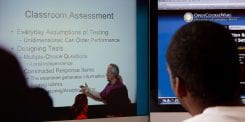Corporate crime and punishment
Henry Pontell calls white-collar corruption ‘more damaging’ than common crime
Enron, WorldCom, Adelphia.
Henry Pontell, a UCI criminology professor and leading expert on white-collar crime, has been waiting for years to see the public outrage that the very mention of these company names now generates.
Many high-profile white-collar crimes have made headlines — remember Ivan Boesky? Michael Milken? Charles Keating? — but Pontell says the response to the latest corporate scandals is angrier because so many innocent people have been personally affected, with thousands of employees losing their jobs and retirement funds.
“When Fortune magazine runs a cover story on white-collar crime with the headline, ‘Send Them to Jail,’ it’s clear a nerve has been hit,” he says.
Pontell was quoted in that Fortune story in March, and he’s done many other national media interviews in recent months. People are increasingly receptive to a message he has been delivering in the classroom and in his own writings for many years.
Pontell is the co-author, with Stephen Rosoff and Robert Tillman, of Profit Without Honor: White-Collar Crime and the Looting of America, which will be released in an updated special edition titled Looting America in the fall of 2002, as well as a number of other books and academic papers on the subject. He has spent most of his career calling attention to the fact that America’s legal system gives corporate leaders far more latitude than common criminals, even though white-collar crime often ends up doing more damage.
WHERE’S THE JUSTICE?
“White-collar criminals cause more pain, death and financial loss than all common criminals combined,” he says. “When you add up the impact of industrial accidents, environmental pollution, fiduciary fraud, unsafe products, and medical fraud, the effects of white-collar crime are much greater than common crime.”
He points out that the price of bailing out just one corrupt financial institution during the savings and loan crisis surpassed the total losses of all the bank robberies in American history.
Pontell and his colleagues have brought national recognition to UCI through research focusing on the scope of white-collar crime in this society and its devastating effects. A professor in the School of Social Ecology since 1979, Pontell chaired the Department of Criminology, Law and Society from 1995 to 2001. The department was ranked fifth among the nation’s top criminology and criminal justice doctoral programs in a study published in the Fall 1998 Journal of Criminal Justice Education. And last year, Pontell was honored with the Association of Certified Fraud Examiners’ Cressey Award for “major lifetime contributions to the study, detection and deterrence of fraud,” including his extensive research on Medicaid fraud and the S&L crisis.
As thrifts were failing in the early ’90s, Pontell testified before Congress and the Senate Banking Committee, asserting that criminal fraud was at the root of the crisis. At the time, the prevailing view was that S&L executives had simply made bad business decisions.
Turns out Pontell was right. But, as he and co-authors Kitty Calavita and Robert Tillman point out in Big Money Crime: Fraud and Politics in the Savings and Loan Crisis, most of those convicted of major thrift crime were given shorter sentences than the average prison term imposed on burglars.
LONG ROAD TOWARD CHANGE
In spite of the increased pressure to punish white-collar criminals today, Pontell says bringing about significant change will be a long, difficult process.
“There are too many ways for [white-collar criminals] to escape the ultimate sanction,” he told the Los Angeles Times in an interview published in July. Those escape routes include hiding behind high-priced lawyers and diffused layers of corporate responsibility.
Another serious obstacle is the shortage of resources for fighting white-collar crime. Pontell was among the first to call attention to this issue — he wrote his doctoral dissertation on the subject.
“Henry Pontell’s first important contribution to criminology was on system capacity — the criminal justice system as a sprinkler system that cuts out when the fire gets hottest,” says John Braithwaite, a white-collar crime expert and professor at The Australian National University. “More than two decades on, that concept is becoming very important to our understanding of white-collar crime. Deals are cut with corporate criminals because the system lacks the capacity to process much complex litigation.”
White-collar crime also proliferates because executives are operating in a competitive culture that places a high value on the pursuit of wealth, an environment that creates more temptation to “go over the line,” Pontell observes.
BEYOND REPROACH
In the classroom, he tries to “take the blinders off” and awaken a sense of outrage. These days, that emotion is a lot easier to tap, which makes students more receptive to another message Pontell wants to get across: the importance of setting a high standard of ethical behavior in the corporate world.
“I want them to see that you carry much more responsibility when you’re in a position to serve as a model for others,” he explains. “Someone with the highest pedigree intentionally stealing or hurting people to enrich themselves or maintain power is a lot more damaging to our social structure and our institutions than the actions of a common criminal.”
— Sherry Angel
A MUST READ
Seldom do books of great scholarship take on the pacing of a thriller or the moral force of a statesman’s oratory. Profit Without Honor does both. In ever-lively anecdotes and startling statistics, the authors expose the dark side of our justice system, a place where well-dressed thieves pull off million-dollar heists with frightening regularity — and almost always get away with it. Professors Rosoff, Pontell and Tillman lay bare for us the environment that gave rise to the Enron and WorldCom scandals. It is a disturbing, fury-igniting story, of course — and one every citizen-shareholder should read. Profit Without Honoris an outstanding book.

